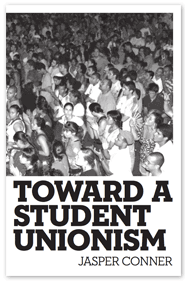Toward a Student Unionism: New Pamphlet and Interview with Jasper Conner
Jasper Conner is an organizer with the Southern Appalachian Mountain Stewards, and a former SDS organizer at George Mason University and in DC. Jasper has just released a new pamphlet on student unionism. From the pamphlet:
If we are to address our common crisis as students, as current and future workers, as people living on this planet, we need to focus on building our power. Students are fighting amazing campaigns, but if we want to hold onto these changes, we have to organize beyond individual policy changes at our respective schools. We must organize for institutional power over our universities and create a way of holding onto that power.
For Student Power: What spurred you to write this pamphlet?
Jasper Conner: Well, I spent two years organizing on campus, and about three years supporting other folks who were organizing on their campuses and I kept seeing the same problems. Everyone is fighting for their issue, but no one is trying to build the power of students to control their lives. Issues-based organizing is always going to be hard unless you've already built power on campus so that students have a strong voice.
FSP: What in your view would be the result of a successful student power movement that's winning ever-larger victories?
JC: On campus, I think it would mean classes that are more responsive to the needs and desires of students; I think it would also end up meaning better working conditions for campus workers because those struggles have tended to come together as students get riled up.
In a broader sense, I think a powerful student union movement could help rebrand the idea of unions. Our grandparents can remember when unions were more directly controlled by workers, when they fought for a better world, but most of our peers were born under Reagan and have been taught that unions are corrupt (most are) and weak.
I mean, it also sure as hell better mean wider access to higher education, but I feel like that's sort of the major point of such a movement, so maybe it goes without saying.
FSP: What was your experience of student government in college?
JC: Two experiences. So at Warren Wilson College, I was a member of what they called "Student Caucus" and that experience was alright. we did real things, like discussed pushing the administration to put up more lights on campus so people would feel safer. And, it was open to all students who could all vote after attending a few meetings. it was very democratic, but the campus was also tiny(800 students).
Now at George Mason, it was totally different. Every person in student gov was just building their resume, they hardly responded at all to some pretty extensive campaign work we did around sweatshop labor being used to produce campus apparel, and they just really didn't do anything that affected students. Most campuses run like GMU, Warren Wilson is an extreme aberration I'd say.
FSP: When speaking to students about student unionism, what kind of reactions do you get?
JC: Mostly confusion, you know, every college already has a student union, that building with a few computers, a study room and vending machines. "Why is this guy excited about that building?" The idea of building student power through student unionism is just unheard of in the US, it takes some explaining even to seasoned campus organizers.
FSP: Do you think the word "union" may have too much baggage to be a useful term when talking about student power? Or are we stuck with it, in the absence of a better alternative?
JC: That's a good question that probably needs to be evaluated in practical experience. Part of me says, half the fight is convincing people that there is power in uniting, that there is power in union. The other half of me says, it doesn't matter if you call it "horseshit," what matters is that we build student power to transform higher education.
FSP: What was the most challenging part of the pamphlet to write?
JC: Hmm... Probably the part about imaging a free university/college/higher ed establishment. I feel like dreaming up a way to institutionalize student power was sort of already done, and the strategy seems fairly simple too, but the long term goals are just pretty hard to really think about. And that's partially because we've had our imagination drained out of us, and partially because it's not always best to have a pre-scripted destination in mind - things have to change and be flexible.

Comments
Yay!
So glad this is finally done, jasper! Great interview PSJ! My favorite line: "Why is this guy excited about that building?"
My column about student unions
Quebec student unions are powerful enough to keep administrators in check. Also, the part about community colleges may as well describe, more or less, how student unionism is implemented at the CEGEP level. There are (ideally) unions for each vocational program - although most of the decisions made by CEGEP-level unions concern all students of such institutions.
Here are a few comments about student unions:
1. Brooklyn College and NYU are the only American schools that I know of that has anything remotely resembling student unions, the former being a school-wide union and the latter having a graduate student union, also university-wide. But BCSU claims it has neither the power nor the support to call for a strike, even in the face of a tuition hike. And Warren Wilson College may as well have an union too.
2. Student union buildings are more accurately termed student centers.
3. Would you feel that, if student unionism was kept all the way from the 1960s, American students wouldn't pay as much tuition today?